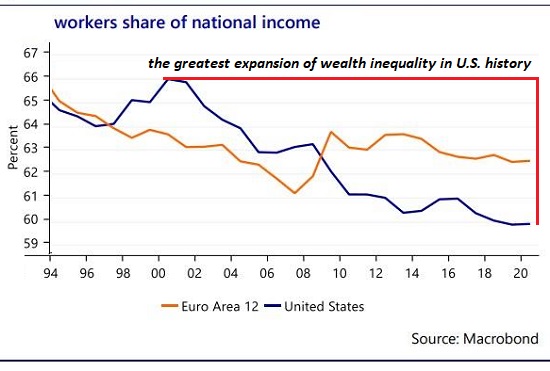If we want to make real progress, we have to properly diagnose the structural sources of the rot that is spreading quickly into every nook and cranny of the society and culture.
It seems my rant yesterday (Let Me Know When It’s Over) upset a lot of people, many of whom felt I trivialized the differences between the parties and all the reforms that people believe will right wrongs and reduce suffering.
OK, I get it, there are differences, but if the “reform” doesn’t change the source of the suffering and injustice, it’s just window-dressing that makes the supporter feel virtuous. Want an example? Let’s take the the “cruel and unusual punishment” for drug-law offenders, many of whom are African-American males whose lives are effectively hobbled by felony convictions and long sentences in America’s Drug War Gulag.
You want a “reform” that actually gets to the root and solves the source of the injustice? It’s simple: decriminalize all drugs and recognize drug use as a medical and social issue rather than a criminal-justice / Gulag issue.
But that won’t happen because too many people are making too much money off the Gulag, which is now a public and private-prison Gulag.
(Other advanced nations have had success with this structural change. Maybe we could learn something from their examples?)
If you’re not ready to demand the full decriminalization of all drugs, then you’re not really interested in solving the problem; you’re just seeking virtue-signaling “reforms” that don’t upset the power structure. And since any real solution necessarily disrupts the power structure benefiting from the status quo, all the painless “reforms” are ineffective.
In other words, either go big and change the power structure or go home and stop promoting your own virtue. This is why the economy is floundering despite all the warm and fuzzy headlines about stocks rising due to the Federal Reserve lowering interest rates: we collectively refuse to consider structural changes in the way “money” is created in our perverse system–perverse because the way “money” is created guarantees soaring inequality.
If you don’t change the way “money” is created and distributed, you change nothing. Did the thousands of pages of financial regulations passed after the 2008-09 debacle reverse wealth and income inequality? The answer is no, wealth inequality is rising even faster after all the feel-good “reforms.” The net result of the “reforms” is the costs of compliance for banks went up substantially, and that regulatory moat simply pushed risky lending outside the banking system.
In other words, the sources of systemic instability and wealth inequality weren’t even touched by the “reforms.” If the financial system were actually stable, why was the Federal Reserve only able to “normalize” interest rates and its bloated balance sheet for a few months after a decade of “growth”? Why is the Fed reverting to “emergency measures” again after a few brief months of “normalizing”?
If all these “reforms” were worth more than a bucket of spit, why isn’t wealth inequality reversing?
Here’s the way our “money” system works: banks borrow trillions of dollars into existence and loan it to debt serfs at high rates of interest. Central banks create “money” out of thin air and distribute it to the very top of the wealth-power pyramid: banks, financiers and corporations.
The only way to change this corrupt, exploitive system that generates inequality as its only possible output is to eliminate central banks and fractional reserve banking, and ban the aggregation of “too big to fail” entities: a system of 1,000 small banks is structurally far less vulnerable than five mega-banks that are tightly bound to virtually every risk-on asset in the entire system.
if you don’t change the way “money” is created and distributed, you change nothing.
Since we’re incapable of changing the sources of financial instability, fragility and inequality (because it would destabilize those benefiting from the status quo), we’re doomed to watch our social and political systems decay and implode.
If we’re honest–an increasingly rare and hazardous condition–we’d admit that the purchasing power of wages has fallen sharply for the bottom 95% in the past 19 years, while the concentration of wealth in the hands of the top .01% has skyrocketed, leaving the bottom 80% with few if any meaningful assets and only the top 5% reaping the gains in our “winner take most” economy.
This systemic decay in social mobility, positive social roles and financial security has eroded the social fabric as the implicit social contract between the powerful and the disenfranchised has unraveled: all the phony “reforms” of the past 19 years simply locked in insiders’ “legal” pillaging.
|
The failure of the political system to recognize and rectify the broad-based decline of America’s economy as experienced by the bottom 80% has eroded trust in politics as a “solution.” Instead, people see the same powerful corporations buying influence with both parties, and tens of thousands of lobbyists in Washington DC writing the legislation passed by both parties (recall Nancy Pelosi’s brief flash of honesty: “We have to pass the bill to know what’s in it.”). Anyone who believes this manifests the ideals of democracy is delusional. To those I offended: please pardon my frustration with all the phony “reforms” that change nothing and thus serve to tighten the grip of the self-serving power structure on the throat of the nation. Here’s the unpalatable reality: The financial rot spread to the “real” economy two decades ago, and now the economic rot is decaying the social and political orders. If we want to make real progress, we have to properly diagnose the structural sources of the rot that is spreading quickly into every nook and cranny of the society and culture. If we’re not willing to disrupt those reaping the outsized benefits from the existing structures of wealth and power, we’re deluding ourselves if we believe we’re solving any problems at the source. |
Workers share of national income, 1994-2020 |
Tags: newsletter























